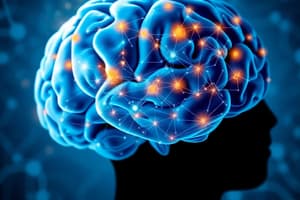Podcast
Questions and Answers
Which component of mental ability involves the ability to draw conclusions from premises or facts?
Which component of mental ability involves the ability to draw conclusions from premises or facts?
- Attention
- Reasoning (correct)
- Intelligence
- Memory
What does fluid intelligence refer to?
What does fluid intelligence refer to?
- Recollecting past experiences to make decisions
- Solving problems based on previously learned knowledge
- Reasoning and solving new problems independently (correct)
- Using skills and knowledge acquired from education
What type of tests are used to measure specific skill sets, such as verbal or mathematical abilities?
What type of tests are used to measure specific skill sets, such as verbal or mathematical abilities?
- Aptitude Tests (correct)
- Standardized Tests
- Personality Tests
- Career Assessment Tests
Which factor can significantly influence cognitive abilities according to studies?
Which factor can significantly influence cognitive abilities according to studies?
How does lifelong learning affect mental abilities in older adults?
How does lifelong learning affect mental abilities in older adults?
Which of the following best describes crystallized intelligence?
Which of the following best describes crystallized intelligence?
What role does attention play in mental ability?
What role does attention play in mental ability?
Which statement reflects the impact of mental ability on daily life?
Which statement reflects the impact of mental ability on daily life?
Flashcards are hidden until you start studying
Study Notes
Definition
- Mental ability refers to cognitive processes that enable individuals to learn, solve problems, and adapt to their environment.
Key Components
- Intelligence: Overall capability to reason, plan, solve problems, think abstractly, comprehend complex ideas, learn quickly, and learn from experience.
- Reasoning: The capacity to draw conclusions from premises or facts, both inductively and deductively.
- Problem-Solving: The ability to find solutions to difficult or complex issues, involving analytical and creative thinking.
- Memory: The process of encoding, storing, and retrieving information.
- Attention: The ability to focus on specific stimuli while ignoring others, crucial for learning and daily tasks.
- Language Skills: The capacity to communicate effectively through understanding and producing language.
Categories of Mental Ability
- Fluid Intelligence: The ability to reason and solve new problems independently of previously acquired knowledge.
- Crystallized Intelligence: The ability to use skills, knowledge, and experience; relies on long-term memory and education.
Measurement
- IQ Tests: Standardized assessments that quantify mental abilities; examples include Wechsler Adult Intelligence Scale (WAIS) and Stanford-Binet Test.
- Aptitude Tests: Assess specific skill sets, such as verbal, mathematical, or spatial abilities.
Influencing Factors
- Genetics: Heredity can influence cognitive abilities; twin studies suggest a significant genetic component.
- Environment: Socio-economic status, access to education, nutrition, and social interactions can enhance or hinder mental abilities.
- Health: Physical well-being, including mental health conditions and neurological diseases, plays a significant role in cognitive functioning.
Development
- Mental abilities can develop throughout life, with critical periods in early childhood and influences from education and experiences.
- Lifelong learning and cognitive engagement can help maintain and improve mental abilities in older adults.
Impact on Life
- Mental ability influences academic and job performance, problem-solving skills, social relationships, and overall quality of life.
- Understanding one's mental abilities can aid in career choices, personal development, and coping strategies.
Enhancement and Training
- Cognitive training programs and brain exercises can improve certain mental abilities, although the efficacy can vary.
- Healthy lifestyle choices, such as regular exercise, proper nutrition, and mental stimulation, contribute positively to cognitive health.
Mental Ability
- Refers to cognitive processes that enable individuals to learn, solve problems, and adapt to their environment.
- Key components include intelligence, reasoning, problem-solving, memory, attention, and language skills.
Intelligence
- Overall capability to reason, plan, solve problems, think abstractly, comprehend complex ideas, learn quickly, and learn from experience.
Reasoning
- Capacity to draw conclusions from premises or facts, both inductively and deductively.
Problem-Solving
- Ability to find solutions to difficult or complex issues, involving analytical and creative thinking.
Memory
- Process of encoding, storing, and retrieving information.
Attention
- Ability to focus on specific stimuli while ignoring others, crucial for learning and daily tasks.
Language Skills
- Capacity to communicate effectively through understanding and producing language.
Categories of Mental Ability
- Fluid Intelligence: Ability to reason and solve new problems independently of previously acquired knowledge.
- Crystallized Intelligence: Ability to use skills, knowledge, and experience, relying on long-term memory and education.
Measurement
- IQ Tests: Standardized assessments that quantify mental abilities, such as the Wechsler Adult Intelligence Scale (WAIS) and Stanford-Binet Test.
- Aptitude Tests: Assess specific skill sets, such as verbal, mathematical, or spatial abilities.
Influencing Factors
- Genetics: Heredity can influence cognitive abilities, as demonstrated by twin studies suggesting a significant genetic component.
- Environment: Socio-economic status, access to education, nutrition, and social interactions can enhance or hinder mental abilities.
- Health: Physical well-being, including mental health conditions and neurological diseases, plays a significant role in cognitive functioning.
Development
- Mental abilities can develop throughout life, with critical periods in early childhood and influences from education and experiences.
- Lifelong learning and cognitive engagement can help maintain and improve mental abilities in older adults.
Impact on Life
- Mental ability influences academic and job performance, problem-solving skills, social relationships, and overall quality of life.
- Understanding one's mental abilities can aid in career choices, personal development, and coping strategies.
Enhancement and Training
- Cognitive training programs and brain exercises can improve certain mental abilities, though efficacy can vary.
- Healthy lifestyle choices, such as regular exercise, proper nutrition, and mental stimulation, contribute positively to cognitive health.
Studying That Suits You
Use AI to generate personalized quizzes and flashcards to suit your learning preferences.




